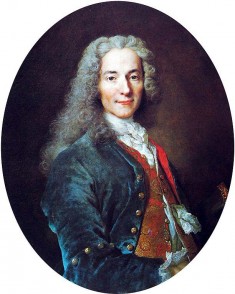| Voltaire | |
|---|---|
 |
|
| Philosopher | |
| Specialty | Enlightenment ideology |
| Born | Nov. 21, 1694 Paris, France |
| Died | May 30, 1778 (at age 83) Paris, France |
| Nationality | French |
Voltaire was one of the great French writers and philosophers of the Enlightenment Age. Much of his writing was punctuated with a sharp sense of wit, which was one of the reasons he was popular during his time and beyond. Voltaire was also a very versatile writer having been able to produce works of poetry, history, long form fiction novels, nonfiction essays, and even scientific tomes.
Voltaire was also known for his controversies, particularly in areas related to religion. He was not a proponent of the Catholic Church and he routinely criticized it. Like many other philosophers of the Enlightenment, Voltaire professed a belief in the need for a separation of church and state.
There were very harsh censorship laws in existence at the time of Voltaire and he constantly challenged those laws in his writings. His iconoclastic writings have survived the test of time and he remains a philosopher many read and study in the modern era.
Voltaire’s Early Years
Voltaire was born on November 21, 1694, in Paris, France. His birth name was François-Marie Arouet. His father was a lawyer and his mother was from a family of nobles. Voltaire attended the Collège Louis-le-Grand where he was educated by Jesuits for seven years. His father wanted his son to become a lawyer, but Voltaire wanted to be a writer. As history shows us, he did become a writer and went on to publish upwards of 2,000 works.
He first started using the fictitious name Voltaire around 1718. The name was derived from an anagram of the Latin spelling of his real last name. It would seem he used the pen name as a means of hiding his identity from his family.
His Secret Writing Career
Voltaire told his father that he was working as a notary in Paris when he was really spending most of his time writing poetry. His father was furious when he found out and forced Voltaire to enter law school. The young philosopher continued to write even when after he was sent to work in the embassy at the Netherlands. He eventually lost his job for having an affair with a young woman. Eventually, he returned to Paris where he continued writing. He had a large number of readers and even those in the aristocracy spoke highly of his muse.
Not everyone was fond of what he had written. After publishing something satirical about Philippe II, Duke of Orléans, Voltaire ended up spending 11 months in prison. Not to be deterred, Voltaire continued to write and even produce plays.
The Work of Voltaire
 Voltaire wrote several very well-received and extremely controversial selections. In truth, he did suffer for his arts as he was constantly being imprisoned or placed in exile. Candide remains his most famous work. First published in 1759, Candide is a novel of great sarcasm which centers on a young man who lived a sheltered lifestyle who is now forced to face the bleakness of the real world.
Voltaire wrote several very well-received and extremely controversial selections. In truth, he did suffer for his arts as he was constantly being imprisoned or placed in exile. Candide remains his most famous work. First published in 1759, Candide is a novel of great sarcasm which centers on a young man who lived a sheltered lifestyle who is now forced to face the bleakness of the real world.
Voltaire wrote a great many philosophical treatises on religion. He attacked flaws he saw in modern religious theories. He was a deist who constantly questioned the role of faith. Voltaire did not like organized religion and he felt no particular faith was required to believe in God. As a proponent of natural law, he felt morality can derive from sources outside of religion.
Voltaire was most definitely not in favor of suppressing religion though. In reality, he was a great believer in tolerance towards religion.
Voltaire might be considered someone who believed in the notion of a philosopher king. Democracy was not something he was a huge fan of because he felt too many of the masses simply were not capable of making good decisions. He was not exactly a believer in monarchs or politicians as he saw them as routinely being too corrupt and self-serving to trust. Voltaire assumed that an enlightened monarch might be the one person best served to rule a nation.
Final Days of Voltaire
At the age of 83, Voltaire returned to Paris after a 20 year absence. He was returning home in order to see a play. The journey was too much for him and he passed away on May 30, 1778, after falling quite ill.